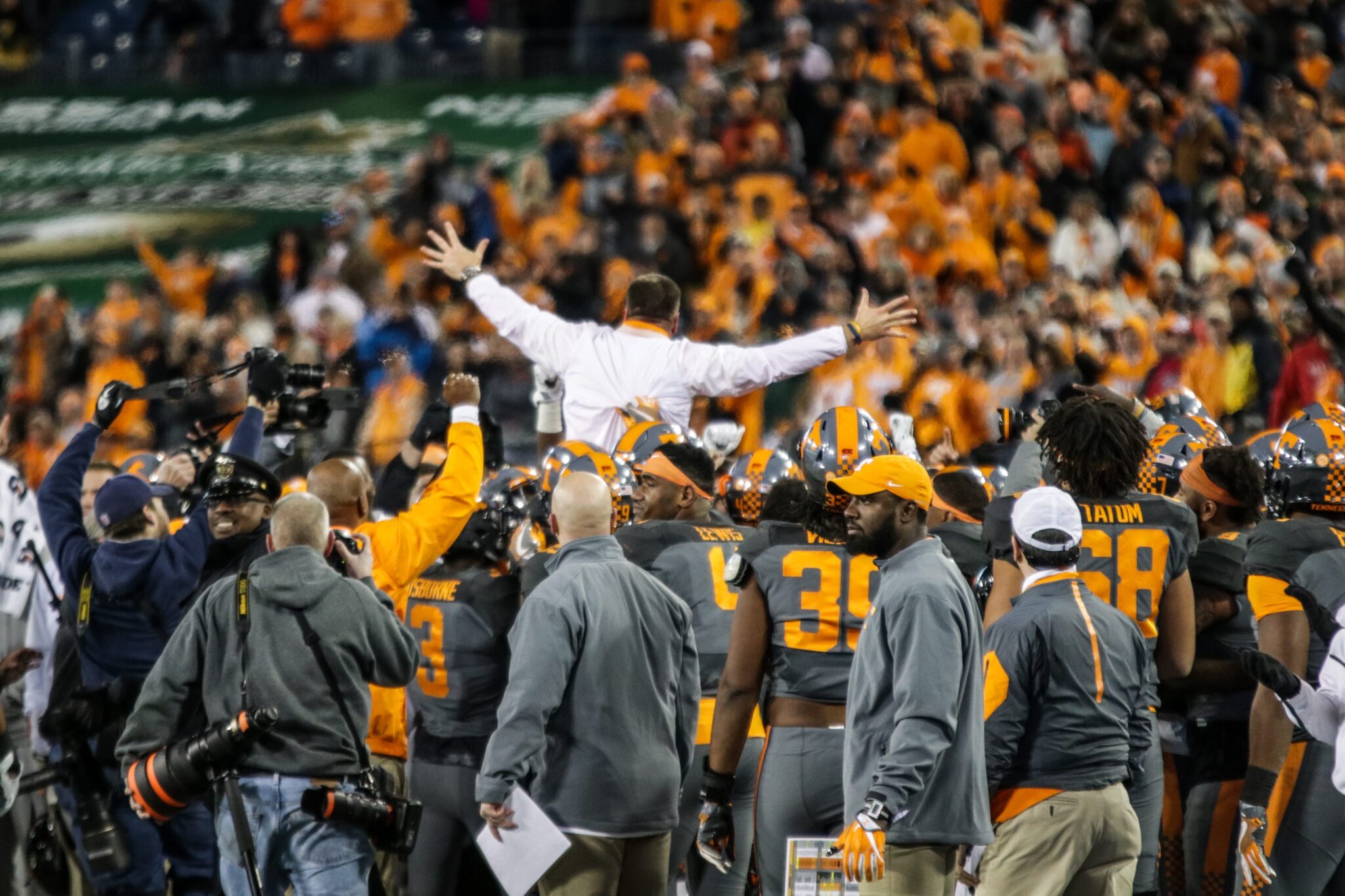An honest evaluation of Tennessee’s 2016 season
Although the Vols didn’t live up to the preseason expectations, it was at least memorable. Here is a full evaluation of what transpired during Tennessee’s chaotic 2016 season.

Tennessee players lift head coach Butch Jones up after the Vols' 38-24 win over Nebraska at the 2016 Franklin American Mortgage Music City Bowl on Dec. 30 in Nashville, Tennessee.
Regardless of any personal animosity toward the result of Team 120’s 2016 campaign, at the very least, you have to say it was memorable. Moments on and off the field never rested in the middle; either the team soared to heights reminiscent of past glory, or sunk underneath the enormous expectations of a desperate fan base.
All the on-field successes and failures, combined with Butch Jones’ weekly press conferences that almost always sent Vol Nation into a collective cringe with a cliché-laden soundbite, makes Tennessee’s 2016 season a challenging one to evaluate. Did the team improve from a promising end to a successful 2015 campaign, or is the program ushering into an era of stagnation under a coach who has made several questionable decisions?
The Record
For the second consecutive season, Tennessee finished 9-4, and for the third straight season, dominated a nameless Big Ten team in a nameless bowl game.
It appears that the program might be in a stagnant state, but let’s consider the following, since Butch Jones won’t let anybody forget: The Vols appeared in three straight bowl games for the first time since 2000-2002, Tennessee won three straight bowl games for the first time since 1994-1996, the recruiting classes have been excellent, the facilities have improved and the program’s value has skyrocketed.
The standard at Tennessee is higher than wins in the Taxslayer, Outback and Music City bowls, but in defense of Jones, the program he took over in 2012 was on the verge of collapse. His brick-by-brick mantra is the catalyst for hundreds of thousands of eye rolls, but it’s also responsible for the program’s inclusion in the national conversation.
The Injuries
Whether fans want to hear it or not, you can’t talk about Tennessee football in 2016 without discussing injuries. While injuries are part of the game, rarely has a team ever suffered such decimation at multiple positions the way Tennessee did this season, especially on the defensive side of the ball.
Here’s a list of notable players who missed playing time due to injury or other reasons:
Alvin Kamara, Jalen Hurd, Jack Jones, Brett Kendrick, Dylan Weisman, Jashon Robertson, Kahlil McKenzie, Shy Tuttle, Danny O’Brien, Alexis Johnson, Jalen Reeves-Maybin, Darrin Kirkland Jr., Cortez McDowell, Quart’e Sapp, Cam Sutton, Malik Foreman, Evan Berry
Throughout the season, multiple position groups have resembled a revolving door of inexperienced faces and hobbled veterans. And it isn’t as if the Vols lost mid-tier players. They lost two defensive captains in Reeves-Maybin and Sutton, as well as promising young defensive linemen in Shuttle and McKenzie Jr.
The litany of injuries explain Tennessee’s dreadful attempt at stopping the run at various points of the season. Against Texas A&M, Alabama, Kentucky and Missouri, the Vols allowed a staggering 406 rushing yards per game and 16 rushing touchdowns. With a fully healthy front seven, those numbers would drop significantly.
Whether the injuries are to blame for a 9-4 record is a different debate, but there’s no denying that losing so many key pieces infringed upon Tennessee’s ability to grow as a cohesive unit throughout the season on the defensive side of the ball.
The high points
The amount of euphoria experienced by Rocky Top after the Florida and Georgia games is immeasurable. Couches burned, televisions were smashed and set on fire as Vol fans sang Kumbaya and “Feels Like ’98” began gaining steam. Beating a bitter rival after 11 years of heartbreaking losses by scoring 38 consecutive point after trailing 21-0 is as good as it gets…unless you follow that up with a Hail Mary on the road against another bitter rival.
Prior to this season, the Vols hadn’t beaten Florida and Georgia in the same season since 2004. That fact alone proves Jones has, at some point, steered the program in the right direction.
Then came the low points.
The low points
Of the four losses, the one that is somewhat excusable is the Alabama loss (more on that later). However, losses to Texas A&M, South Carolina and Vanderbilt were inexcusable, and for differing reasons.
Tennessee shredded the Aggie defense to the tune of 684 yards and 38 points, offensive stats that normally result in victories. However, the Vols also turned the ball over a ridiculous seven times, with four coming from their senior quarterback, Joshua Dobbs. With just a tad more ball control, Tennessee probably advances to 6-0, but instead, ended up losing in double overtime, 45-38.
But the losses Tennessee fans will always recall when the 2016 season is mentioned are the stunning road upsets at the hands of South Carolina and Vanderbilt, two teams that frankly can’t hold a candle to the talent level on the Vols’ roster. Yet, the Gamecocks managed to throw a wrench in Tennessee’s division title plans, while the Commodores slammed the door shut on a potential Sugar Bowl appearance for the Vols. So while the orange and white managed to topple the cream of the crop in the SEC East, they somehow fell back to Earth with losses to perennial SEC East cellar dwellers.
Team 120 also experienced some drama off the field when star running back Jalen Hurd — who entered the season on the cusp of breaking Tennessee’s career rushing record — decided to transfer after the South Carolina loss. Hurd has explained his motives behind transferring, but the build-up to his decision remains a mystery.
Who surprised and disappointed
Let’s start with the positives. After the wide receivers struggled for the majority of 2015, Josh Malone and Jauan Jennings showed drastic improvements across the board in 2016. In fact, Malone was arguably the best receiver in the SEC, finishing the season with 50 receptions, 972 yards and 11 touchdowns. Meanwhile, Jennings was arguably the team’s most improved player, as his transition from quarterback to wide receiver appears to be going smoothly. In 2016, he caught 40 passes for 580 yards and seven scores, including the infamous Hail Mary against Georgia. Jennings still has work to do with route running and occasionally falls victim to mental lapses, whether it be with drops or penalties, but his fierce competitive nature surely makes him a dependable weapon for whichever quarterback is taking snaps next season.
On the opposite end of the spectrum, Jonathan Kongbo was easily the biggest disappointment. That’s not to say he won’t have a productive 2017 season, but after arriving to Knoxville as the top-rated JUCO player in the country, his lack of playing time was puzzling. The dominance of Derek Barnett and the solid play of Corey Vereen at defensive end probably had a hand in Kongbo’s rare opportunities, but maybe he simply wasn’t ready for SEC competition right off the bat.
Regardless, with Barnett and Vereen both gone, and Kongbo’s apparent willingness to play defensive tackle, 2017 should see Kongbo receiving an exponential increase in playing time.
The verdict
Butch Jones might be a life champion after winning the coveted Music City Bowl, but 2016 was a massive failure, and 100 percent of the blame rests on his shoulders.
At this point, a novel could be written about Jones’ mind-numbing decisions as the coach in Knoxville, but let’s just highlight the more egregious actions of 2016.
First, the team’s lack of preparation for the Alabama and South Carolina games is frankly disturbing. The Crimson Tide are the standard for success in college football. When the quarterback admits after the game that the team wasn’t prepared enough, that’s the coach’s fault. Just two weeks later, with a bye week in between, the Vols again looked unprepared against an inferior South Carolina team. A team who had struggled to put away UMass the week before despite its quarterback, who would’ve been a senior in high school had he not skipped a grade, making his collegiate debut.
Second, the decision to kick a game-tying field goal instead of attempt a Hail Mary against South Carolina makes no sense given the circumstances. To put it kindly, Aaron Medley isn’t a good kicker. He’s solid with the short stuff, but any field goal attempt longer than 40 yards might as well be a turnover. In his career, Medley is only 9-of-25 from 40 yards and beyond, including an 0-of-5 mark from kicks beyond 50 yards. The length of the potential game-tying field goal against the Gamecocks? 58 yards. After already converting on one Hail Mary earlier in the season, it only made sense to opt with something that had previously worked over something that had never once worked. Predictably, Jones went with Option B.
Lastly, Jones continues his annual tradition of botching his management of timeouts. Against Vanderbilt, down 45-34 with a little over two minutes remaining and a birth to the Sugar Bowl on the line, the Vols faced a critical fourth down. Instead of having a play in his back pocket for the situation at hand or rushing the field goal unit onto the field to preserve all three of his timeouts, Jones instead called a timeout. Furthermore, his fourth-down play call was a short throw to Kamara well behind the line to gain. Consequentially, Kamara ran out of bounds well before reaching the first-down marker, which he immediately regretted after realizing what he had done. However, it didn’t matter, as multiple Vanderbilt defenders were closing in on Kamara and would’ve stopped him anyway.
As previously mentioned, there is so much more, but those three examples exemplify why Jones is such a polarizing figure in Knoxville. Given the team’s trajectory from 2013 to 2015, a preseason No. 9 ranking and an overwhelming number of experts, analysts and members of the media selecting Tennessee to win the SEC East were perfectly justified.
Yet, Tennessee opened its season with a muffed punt from Cam Sutton, and ended it by carrying their coach on their shoulders after winning the Music City Bowl. That final scene proves that Sutton’s gaffe in the highly anticipated season opener perfectly symbolizes the 2016 season:
A botched attempt at a return to dominance.
Edited by Nathan Odom
Featured image by Craig Bisacre, courtesy of Tennessee Athletics
Follow me @DavidJBradford1 on Twitter, email me at dbradfo2@vols.utk.edu for any questions.



